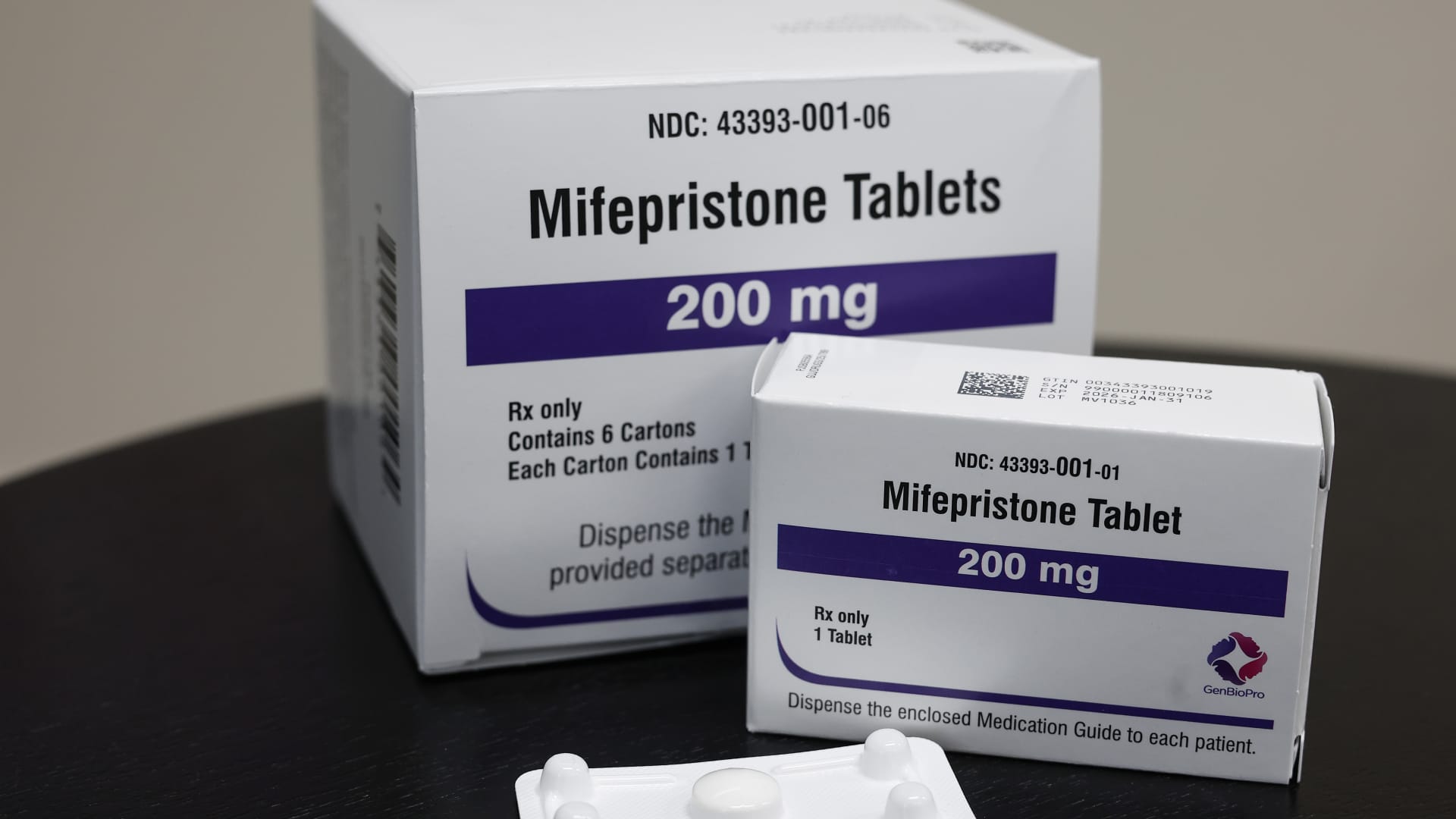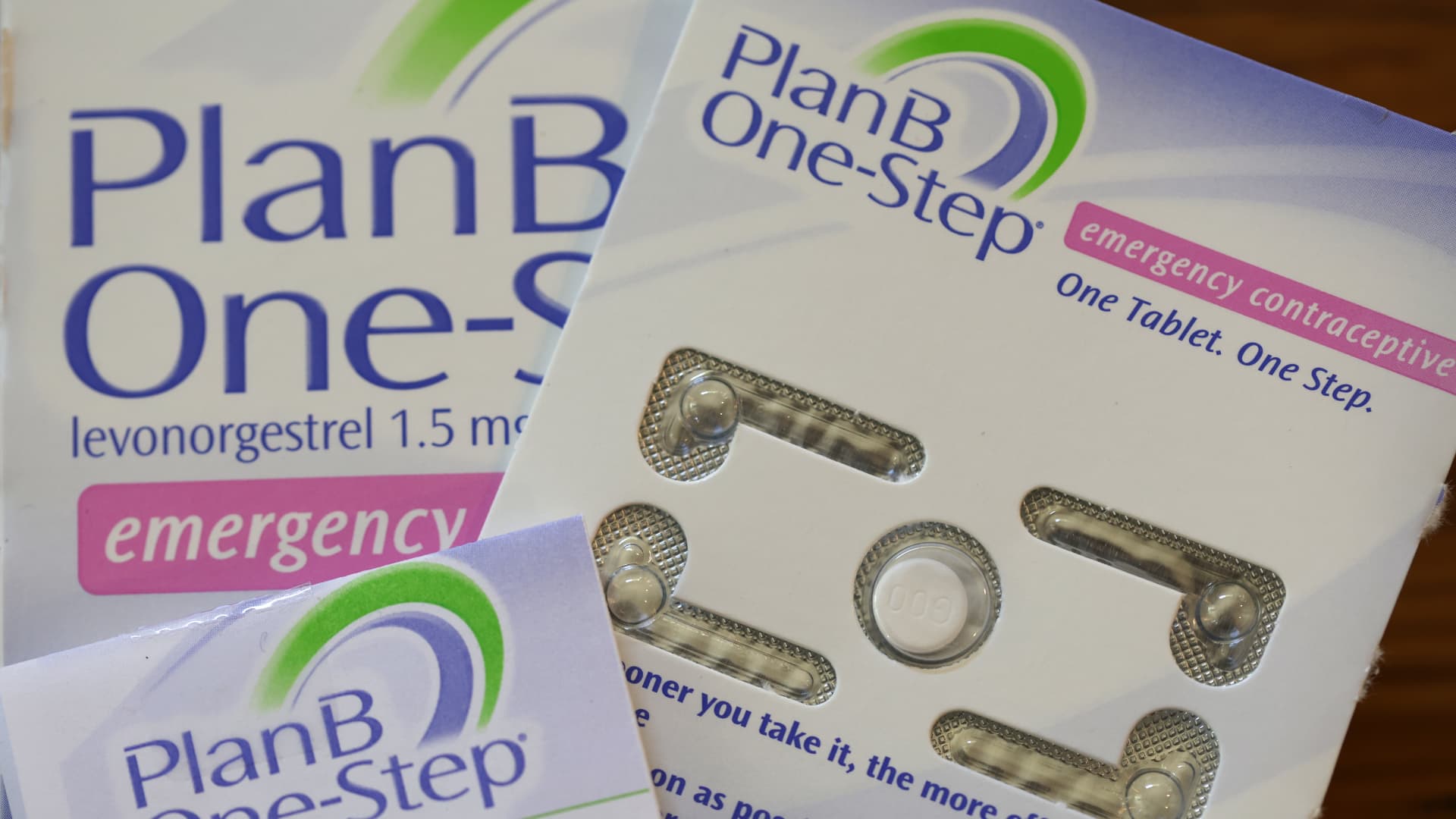Appeals court judges hammer FDA, drugmaker over abortion pill mifepristone
The Supreme Court late last month ordered mifepristone to remain on the market without restrictions while the legal battle plays out in the 5th Circuit.

In this photo illustration, packages of Mifepristone tablets are displayed at a family planning clinic on April 13, 2023 in Rockville, Maryland.
Anna Moneymaker | Getty Images
A panel of judges on Wednesday hammered the Food and Drug Administration and a pharmaceutical company during arguments over the abortion pill mifepristone.
The hearing before the three judges at the U.S. 5th Circuit Court of Appeals comes 11 months after the Supreme Court ruled there was no longer a federal constitutional right to abortion.
The lawsuit argued Wednesday, which was filed by a group of anti-abortion doctors called the Alliance for Hippocratic Medicine, aims to pull mifepristone from the U.S. market.
Lawyers representing the Food and Drug Administration, mifepristone distributor Danco Laboratories, and the anti-abortion doctors each presented their side of the case.
The judges who heard the arguments all were nominated by Republican presidents. Judges James Ho and Cory Wilson were appointed by Donald Trump. Judge Jennifer Elrod was appointed by George W. Bush.
Justice Department lawyer Sarah Harrington opened the arguments by describing the lawsuit as an unprecedented, unjustified attack on the FDA's scientific expertise.
Ho immediately pushed back on the characterization of the lawsuit as unprecedented.
"I hate to cut you off so early, but you've said unprecedented – we had a challenge to the FDA just yesterday," Ho said.
Harrington said a court has never vacated an FDA determination that a drug is safe to sell on the market. The agency can make a determination to pull a drug from the market but it is not a court's role to second guess the agency's expertise, Harrington said.
Ho would later press Danco Laboratories attorney Jessica Ellsworth on the same issue.
"I don't understand this theme — the FDA can do no wrong. That is basically the narrative you all are putting forth — nobody should ever question the FDA," Ho said.
"We are allowed to look at the FDA just like we are allowed to look at any agency, that's the role of the courts," Ho said.
The judges also pressed the government and Danco on whether more women would seek emergency care since the FDA eased its regulations and expanded access to mifepristone.
Wilson pointed to the agency's decision to remove in-person doctors' visits, allow medical professionals other than a doctor prescribe mifepristone, and allow delivery of the medication by mail.
The judge said it appeared to him that these changes will make it "much more likely that patients are going to go to emergency care." Wilson raised a scenario of a hospital where there might be only one doctor on duty in an emergency who would object to participating in an incomplete abortion.
Harrington strongly disputed that characterization that the FDA changes make mifepristone unsafe, and pointed to data throughout her arguments that supports medication's safety.
The Justice Department, in its brief to the court, said sepsis and hemorrhage occurs in just 0.2% of patients who take the drug, and the rates of blood transfusion or hospitalization are 0.7% or less.
Ho also questioned whether FDA properly approved mifepristone in 2000 under a pathway that allows the agency to authorize drugs for serious illnesses in which other medications aren't available.
"Pregnancy is not a serious illness," Ho said. The judge later asked whether Mother's Day celebrates illness.
Ellsworth said the FDA uses the terms "condition," "illness" and "disease" interchangeably. The FDA has used this approval pathway for acne and infertility, conditions that are not seen as serious illnesses, she said.
Elrod called Ellsworth out for language in Danco Laboratories' court filings that called a lower court ruling in Texas against the FDA an unprecedented judicial assault.
"Those statements reflect our view that the district court was very far outside the bounds," Ellsworth said.
"So you think it is appropriate to attack the district court personally in the case in that way?" Elrod asked.
Ellsworth said the filings attacked the district's court's analysis, though she said the legal team might have chosen different language if there had been more time to prepare the filings.
Challenge to mifepristone
The outcome of the hearing could determine whether women will continue to have access to what has become the common method to terminate a pregnancy in the U.S.
The appeals court panel's ruling could come at any time now that arguments have ended. But regardless of what that ruling says, the losing side is certain to ask the Supreme Court to hear an appeal of the decision.
If the Supreme Court accepts the case for appeal, mifepristone will remain widely available until the justices issue a final decision in the case. But if it refuses to hear an appeal, the 5th Circuit decision will be the final word on the drug's fate.
The Alliance for Hippocratic Medicine in November sued the FDA in U.S. District Court for the Northern District of Texas, challenging the agency's authorization of mifepristone, which occurred in 2000.
The group argued the agency did not use the correct process to approve mifepristone, claimed the medication is unsafe, and asked a judge to order the drug withdrawn from the market.
Those claims were strongly disputed by the FDA, leading medical associations, nearly half the U.S. states, and more than 200 members of Congress.
Those entities argued in court filings that the FDA properly approved mifepristone and that the approval was based on extensive data that supported the medication's safety and effectiveness.
But U.S. Judge Matthew Kacsmaryk ruled in favor of the anti-abortion group's claims and suspended the FDA approval of mifepristone. His order would have halted sales of the medication nationwide pending appeal.
Days later, the DOJ appealed Kacsmaryk's decision to the 5th Circuit, which handles cases arising from the Northern District of Texas.
In April, a three-judge panel at the circuit said that FDA's approval of mifepristone would remain in place pending the outcome of the DOJ's appeal.
That panel said the challenge to the approval likely is barred by federal statute of limitations, although the judges made clear that their determination was based on an "abbreviated review." But that panel also blocked mail delivery of the drug and imposed tight restrictions on how the medication is used.
Soon afterward, the high court, acting at the request of the Biden administration, ordered mifepristone to remain on the market without restrictions while the legal battle played out in the 5th Circuit.
If the anti-abortion group wins
The Alliance Defending Freedom, an anti-abortion legal organization representing the doctors' group, asked the three judges who heard Wednesday's arguments to uphold Kacsmaryk's order in full, halting sales of mifepristone nationwide.
The trio of judges is different than the 5th Circuit panel that last month issued the order that imposed some restrictions on the availability of mifepristone while keeping the drug on the market.
Glenn Cohen, a former DOJ lawyer, said the current three-judge panel is not bound by the prior panel's decision in April.
The new panel could issue an order that goes further or less far than the restrictions imposed in April, said Cohen, who is now a professor at Harvard Law School. Or the panel could go in a different direction altogether, he said.
Cohen filed a brief at the 5th Circuit with other drug law experts in support of the FDA's position.
He said the Supreme Court will likely agree to take the case if the 5th Circuit panel decides to pull mifepristone from the U.S. market.
Cohen argued the high court justices would take that position because a majority of them had approved the DOJ's request to keep mifepristone available without restrictions as lower-court litigation played out.
If the FDA wins
The DOJ is asking the 5th Circuit to reverse Kacsmaryk's sweeping order and keep mifepristone available under the FDA's current regulations. The FDA now allows women to obtain mifepristone without visiting a doctor in person and can receive the prescription drug through the mail.
The prior 5th Circuit panel in April had blocked mail delivery of mifepristone, re-imposed a requirement that women visit doctors to be prescribed the pill, and shortened the time period when women can take the drug from the 10th week of pregnancy to the seventh week.
That panel in its ruling last month said the FDA's prior decision to loosen its regulations on mifepristone would result in more women seeking emergency care due to serious complications from the medication.
The Justice Department, in its appeal, said the panel misunderstood data that shows that the medication is safe.
"And study after study has shown that when mifepristone is taken consistent with its approved conditions of use, serious adverse events are 'exceedingly rare,'" the DOJ said in its brief to the panel that will hear Wednesday's arguments.
"In addition, pregnancy itself entails a significantly higher risk of serious adverse events, including a death rate 14 times higher than that associated with legal abortion," the DOJ said.
Cohen believes the Supreme Court is less likely to take the case if the government wins at the 5th Circuit and the anti-abortion group appeals the ruling.
He said the fact that a majority of justices chose to keep mifepristone available while lower-court litigation plays out suggests they are not particularly sympathetic to the anti-abortion doctors' case.
And while the lawsuit raises issues the Supreme Court might be interested in at some point, he said the case against the FDA is a technical one that the justices might prefer to pass on reviewing.

 KickT
KickT 
































